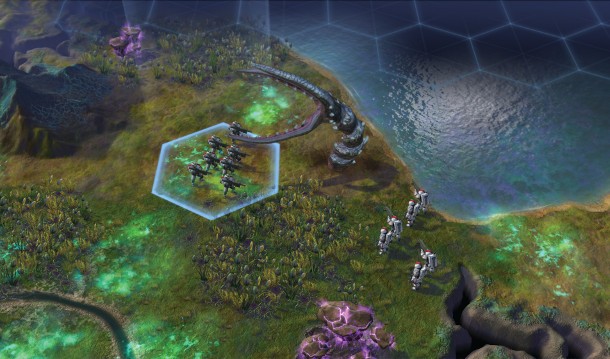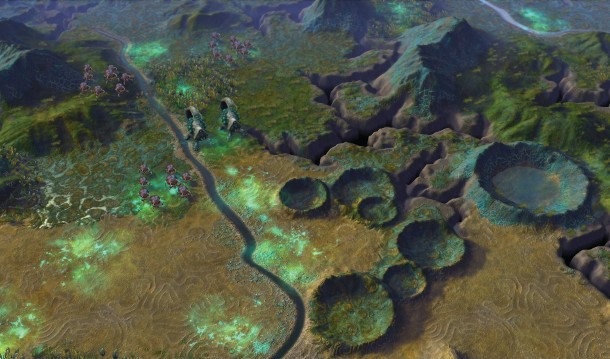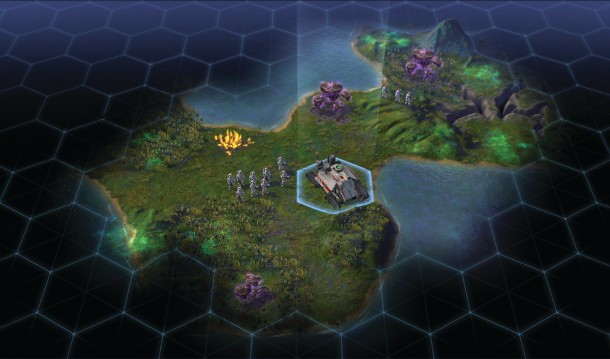Please support Game Informer. Print magazine subscriptions are less than $2 per issue
Civilization: Beyond Earth

My first reaction when I heard that the next Civilization game takes players to an alien world is probably not so different than other strategy fans. "Why not just call it Alpha Centauri?" I muttered to myself. It was also the first question I asked co-lead designer Dave McDonough (who is teamed up with Will Miller) and lead producer Lena Brenk.
"There is a lot of inspiration from Alpha Centauri in this game," McDonough says. "We even have a couple of people who worked on that game still on the team and helping us make the game. It's not Alpha Centauri 2. It's not a sequel. It's a whole new imagining of what civilization in the future, civilization in space could be. There are many homages and nods and winks to Alpha Centauri. And there's a huge creative and spiritual debt we owe to the groundwork that game laid, but this is a whole new idea." It also helps to know that the Alpha Centauri property is still owned by EA. "The heart of Alpha Centauri lives at Firaxis, though," Miller says.
Beyond Earth presents an opportunity for Firaxis to throw off the shackles of human history and give players the chance to sculpt their own destinies. Civilization games typically have a set endpoint at humanities modern age, but Beyond Earth has given Firaxis the opportunity and the challenge of creating a greater sense of freedom.
"There's no modern age arrival point at which time you can crown a winner, so we could decide what it means to win," McDonough says. "We decided to make it the next great leap, the next great turning point in the story of the human race. You get to decide what that is."
The five different victory conditions that represent that next major event in human history are tied to the new technology web. At the start of the game, players will choose leaders and factions (no longer bundled with one another) and choose colonists and equipment to settle the land. Once descending from orbit, the technology web allows players to move in a number of directions.

As players get further from the center starting point, they'll encounter technologies in one of three affinities. Purity technologies help humanity make their new home closer to Earth in its heydey. Harmony options adapt settlers rather than the terrain for a symbiotic existence. Supremacy disregards the land and focuses on humanity's independence from its environment, often involving a move toward a machine-like existence.
Each of these affinities has a related victory condition. Purity players achieve a "promised land" victory by building a warpgate to bring humans from Earth to settle the new land. Supremacy players will achieve their "emancipation" goal by building that same warpgate. Instead of bringing humans through, forces will return to earth to free humans from their fleshy mortality.
Harmony players will be focused on the new planet. "Transcendence" will allow them to awaken a superorganism slumbering deep in the planet.
The other two victories are a traditional military conquest (achieved by wiping out all opposing civilizations) and "first contact," which involves finding evidence of alien life, building a device, and making contact. "You can go in any direction or all of them depending on what you find on the ground, the kind of playstyle you like, the neighbors around you, and the victory condition you're going for," McDonough says. "The web is much more customizable, so that by the end of the game, the technology that you have really represents who you've grown up to be."
The different affinities and technologies will have cosmetic impact on your civilization. Your leader and your units will adapt to your decisions. "It's the engine of the game, visually," Brenk says.

"It's also important to note that you're not going to get all the technologies in a single game," McDonough explains. "The clash between your technological limits will drive a lot of the in-game play. The web design allows you to play the game in a discovery-oriented mode."
In addition to the drastic changes to victory conditions, players will encounter a stronger narrative thread in each of their games. Mankind is leaving Earth following something called "the great mistake." "A messed up Earth wouldn't be reason enough for us to leave," Miller says. He goes on to tell a story of the inevitable photograph that will be taken of a life-sustaining world somewhere out in space. It's that hopefulness and challenge that sets mankind on its new journey.
Once on the planet, quests will help players define their civilization's identity, giving players tasks (including chains of quests) that will help tell a story. Players will also have access to technology that gives them control over part of the planet's orbit. These creations can impact the terrain below, aid with terraforming, enhance tiles, rile up alien wildlife, or initiate strikes against enemies. Much like ocean-faring vessels in previous Civilization games, orbital units can be destroyed and interfered with.
Despite all these changes, Beyond Earth will still feel familiar to franchise fans. "Cities, territories, improving terrain, getting technologies, building military units, those are things that every Civ player will recognize and are at the heart of this game, too," McDonough says. "But all the flesh that lives on those bones has been totally redesigned. All of it was designed holistically to live on the bones of a Civ game, but be a whole new experience."
Civilization: Beyond Earth will arrive in 2014 for PC.











